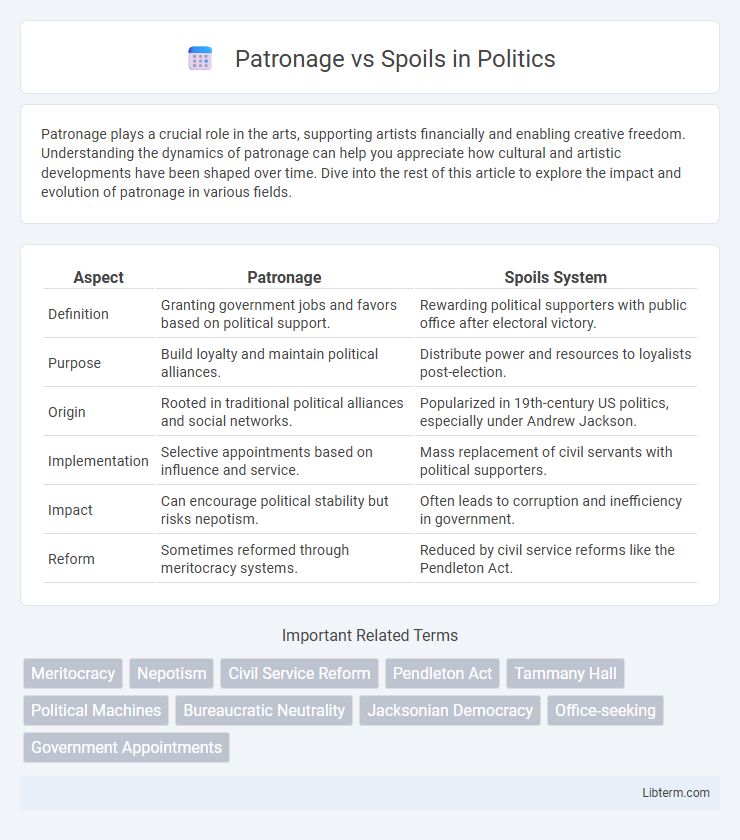Patronage plays a crucial role in the arts, supporting artists financially and enabling creative freedom. Understanding the dynamics of patronage can help you appreciate how cultural and artistic developments have been shaped over time. Dive into the rest of this article to explore the impact and evolution of patronage in various fields.
Table of Comparison
| Aspect | Patronage | Spoils System |
|---|---|---|
| Definition | Granting government jobs and favors based on political support. | Rewarding political supporters with public office after electoral victory. |
| Purpose | Build loyalty and maintain political alliances. | Distribute power and resources to loyalists post-election. |
| Origin | Rooted in traditional political alliances and social networks. | Popularized in 19th-century US politics, especially under Andrew Jackson. |
| Implementation | Selective appointments based on influence and service. | Mass replacement of civil servants with political supporters. |
| Impact | Can encourage political stability but risks nepotism. | Often leads to corruption and inefficiency in government. |
| Reform | Sometimes reformed through meritocracy systems. | Reduced by civil service reforms like the Pendleton Act. |
Understanding Patronage: Definition and History
Patronage refers to the support, encouragement, and financial aid provided by a patron, often in exchange for loyalty or services, historically significant in politics and the arts. It originated in ancient societies where influential individuals or groups granted benefits to clients or supporters to maintain power and influence. Understanding patronage highlights its role in shaping social and political structures through sustained networks of reciprocity and obligation.
The Spoils System: Origins and Evolution
The Spoils System originated in the early 19th century under President Andrew Jackson, institutionalizing the practice of awarding government jobs to political supporters. This system evolved as a method to consolidate power by replacing experienced civil servants with loyal party members, often leading to inefficiency and corruption. Over time, reforms such as the Pendleton Civil Service Act of 1883 aimed to curb the spoils system by introducing merit-based appointments.
Key Differences Between Patronage and Spoils
Patronage involves the appointment of individuals to government positions based on political support and loyalty, emphasizing relationship-building and long-term alliances, while spoils refer to the practice of awarding public offices and benefits to political supporters as immediate rewards for winning elections. Patronage systems often promote stability and continuity within political networks, whereas spoils focus on short-term gains that can lead to corruption and inefficiency. Key differences lie in patronage's emphasis on loyalty and governance, contrasting with spoils' transactional, reward-based allocation of public resources.
Political Motivations Behind Patronage and Spoils
Political motivations behind patronage and spoils systems center on consolidating power and rewarding loyalty within political networks. Patronage involves appointing supporters to government positions based on allegiance, aiming to secure long-term influence and policy control. Spoils, on the other hand, emphasize distributing public offices and resources as immediate rewards for campaign support, fostering short-term political gain and factional loyalty.
Impact on Government Efficiency
Patronage systems often lead to inefficiency in government by prioritizing loyalty over merit, resulting in unqualified appointments and reduced bureaucratic competence. Spoils systems exacerbate this by awarding jobs as political rewards, undermining institutional stability and increasing corruption risks. In contrast, merit-based appointments enhance government efficiency by promoting skilled personnel and fostering accountability.
Influence on Political Loyalty and Corruption
Patronage systems reinforce political loyalty by rewarding supporters with jobs or favors, creating a network of dependent allies and increasing party cohesion. Spoils systems, emphasizing the distribution of government positions after electoral victories, intensify corruption risks by prioritizing political loyalty over meritocratic appointments, leading to inefficiency and graft. Both practices intertwine political influence with personal gain, undermining transparent governance and fostering clientelism.
Patronage in Modern Governance
Patronage in modern governance refers to the allocation of public resources and positions based on loyalty and support, often reinforcing political networks. This practice influences policy implementation by promoting allied individuals who can ensure government stability and continuity. While patronage can enhance administrative efficiency through trusted appointments, it risks undermining meritocracy and fostering clientelism within public institutions.
The Decline of the Spoils System
The decline of the spoils system marked a significant shift in American political history, moving toward merit-based civil service reforms following the Pendleton Civil Service Reform Act of 1883. This legislation curbed patronage by requiring government jobs to be awarded based on qualifications rather than political connections, reducing corruption and increasing efficiency. As a result, the spoils system's influence waned, paving the way for professionalized public administration.
Reforms and Legislation: Shifting the Balance
Reforms and legislation targeting patronage and spoils systems have aimed to reduce corruption and promote merit-based appointments, exemplified by the Pendleton Civil Service Reform Act of 1883, which established competitive exams for government jobs. These measures curbed the unchecked distribution of political favors, strengthening institutional integrity and efficiency. Continued legislative efforts have focused on transparency and accountability to shift the balance away from patronage toward professional public service.
Case Studies: Patronage and Spoils in Practice
Case studies of patronage and spoils reveal distinct impacts on governance and political stability. In the United States during the 19th century, the spoils system enabled victorious political parties to distribute government jobs to supporters, often prioritizing loyalty over competence, leading to calls for civil service reform. Conversely, Italy's patronage networks exemplify how long-term reciprocal relationships between politicians and constituents maintain political support but can entrench corruption and weaken institutional accountability.
Patronage Infographic

 libterm.com
libterm.com